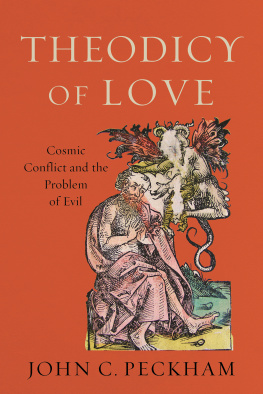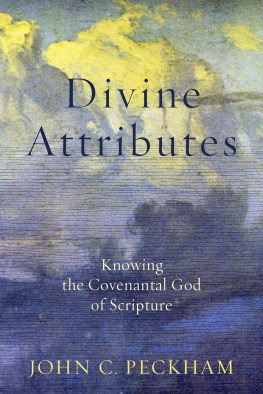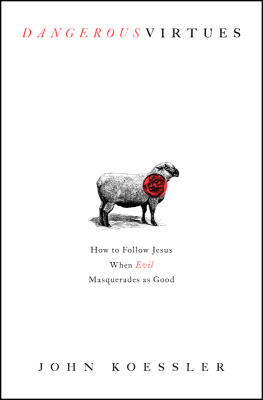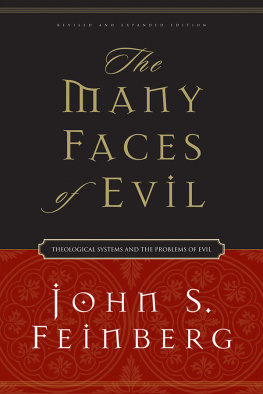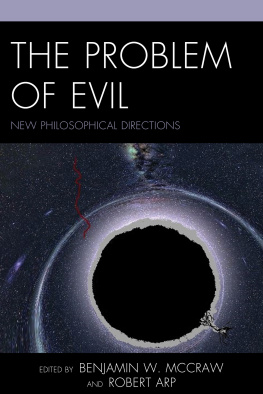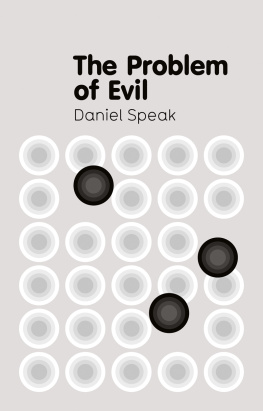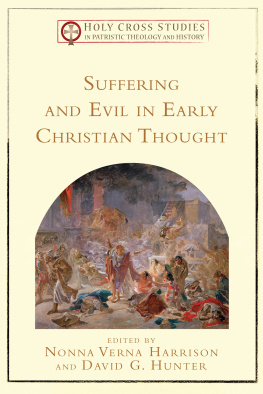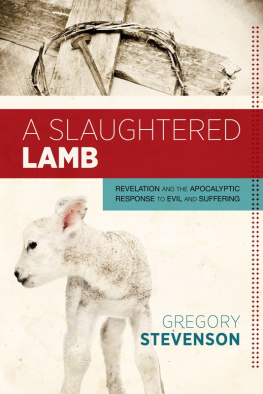John C. Peckham - Theodicy of Love: Cosmic Conflict and the Problem of Evil
Here you can read online John C. Peckham - Theodicy of Love: Cosmic Conflict and the Problem of Evil full text of the book (entire story) in english for free. Download pdf and epub, get meaning, cover and reviews about this ebook. year: 2018, publisher: Baker Publishing Group, genre: Religion. Description of the work, (preface) as well as reviews are available. Best literature library LitArk.com created for fans of good reading and offers a wide selection of genres:
Romance novel
Science fiction
Adventure
Detective
Science
History
Home and family
Prose
Art
Politics
Computer
Non-fiction
Religion
Business
Children
Humor
Choose a favorite category and find really read worthwhile books. Enjoy immersion in the world of imagination, feel the emotions of the characters or learn something new for yourself, make an fascinating discovery.
- Book:Theodicy of Love: Cosmic Conflict and the Problem of Evil
- Author:
- Publisher:Baker Publishing Group
- Genre:
- Year:2018
- Rating:5 / 5
- Favourites:Add to favourites
- Your mark:
- 100
- 1
- 2
- 3
- 4
- 5
Theodicy of Love: Cosmic Conflict and the Problem of Evil: summary, description and annotation
We offer to read an annotation, description, summary or preface (depends on what the author of the book "Theodicy of Love: Cosmic Conflict and the Problem of Evil" wrote himself). If you haven't found the necessary information about the book — write in the comments, we will try to find it.
Theodicy of Love: Cosmic Conflict and the Problem of Evil — read online for free the complete book (whole text) full work
Below is the text of the book, divided by pages. System saving the place of the last page read, allows you to conveniently read the book "Theodicy of Love: Cosmic Conflict and the Problem of Evil" online for free, without having to search again every time where you left off. Put a bookmark, and you can go to the page where you finished reading at any time.
Font size:
Interval:
Bookmark:
THEODICY
OF LOVE
2018 by John C. Peckham
Published by Baker Academic
a division of Baker Publishing Group
PO Box 6287, Grand Rapids, MI 49516-6287
www.bakeracademic.com
Ebook edition created 2018
Ebook corrections 01.26.2021
All rights reserved. No part of this publication may be reproduced, stored in a retrieval system, or transmitted in any form or by any meansfor example, electronic, photocopy, recordingwithout the prior written permission of the publisher. The only exception is brief quotations in printed reviews.
Library of Congress Cataloging-in-Publication Data is on file at the Library of Congress, Washington, DC.
ISBN 978-1-4934-1576-2
Unless otherwise noted, Scripture quotations are from the New American Standard Bible, copyright 1960, 1962, 1963, 1968, 1971, 1972, 1973, 1975, 1977, 1995 by The Lockman Foundation. Used by permission. (www.Lockman.org)
Scripture quotations labeled CEV are from the Contemporary English Version 1991, 1992, 1995 by American Bible Society. Used by permission.
Scripture quotations labeled NIV are from the Holy Bible, New International Version. NIV. Copyright 1973, 1978, 1984, 2011 by Biblica, Inc. Used by permission of Zondervan. All rights reserved worldwide. www.zondervan.com
Scripture quotations labeled NKJV are from the New King James Version. Copyright 1982 by Thomas Nelson, Inc. Used by permission. All rights reserved.
Scripture quotations labeled NRSV are from the New Revised Standard Version of the Bible, copyright 1989, by the Division of Christian Education of the National Council of the Churches of Christ in the United States of America. Used by permission. All rights reserved.
Cover
Half Title
Title Page
Copyright page
Preface
Acknowledgments
Abbreviations
1. The Problem of Evil and the Free Will Defense
2. Love, Evil, and Gods Unfulfilled Desires
3. The Cosmic Conflict Framework
4. The Nature of the Conflict and Rules of Engagement
5. Evil Defeated but Not Yet Destroyed
6. Evaluating the Theodicy of Love
Bibliography
Scripture Index
Author Index
Subject Index
Back Cover
Why do you make me look at injustice?
Why do you tolerate wrongdoing?
Destruction and violence are before me;
there is strife, and conflict abounds....
Your eyes are too pure to look on evil;
you cannot tolerate wrongdoing.
Why then do you tolerate the treacherous?
Why are you silent while the wicked
swallow up those more righteous than themselves?
Hab. 1:3, 13 NIV
Since I was a young childindeed for as long as I can rememberI have been deeply troubled by the suffering and injustice in this world. I have wondered how the evil I saw in this world could be reconciled with my belief that God is love (1 John 4:8, 16). Before I knew what it was called, I was wrestling with the problem of evil: If God is all-good and all-powerful, why is there evil? And so much of it? One of the primary reasons I became fascinated with theology was because of this problem, perhaps the most difficult problem that Christian theism faces.
The problem of evil is far more than a philosophical or theological problem. The kind and amount of evil in this world present a deep, sometimes faith-crushing religious or existential problem, which is particularly acute for those who believe in an all-good and all-powerful God. Many people have lost faith for this reason, and others find it difficult, if not impossible, to believe in the God of Christianity in light of the horrendous evil in this world.
Although the religious, existential, and philosophical problems of evil should be distinguished and addressed quite differently, they should not be thought of as entirely unrelated. On the one hand, often the last thing somebody needs to hear while in the midst of acute grief is a philosophical or theological treatment of evil. Often, the best thing that can be done in the presence of someone grieving or suffering is to remain silent relative to attempts at explanation while expressing compassionate love and care for them in meaningful, tangible ways.
On the other hand, many Christians who undergo profound suffering eventually seek answers regarding how to reconcile such suffering with their faith in the goodness and love of God. I often wonder how much the framework one holds prior to undergoing such suffering or grief makes a difference in how suffering and grief are experienced. It seems to me that the very way one conceives of God and Gods providential involvement in this world bears significantly not only on how suffering and evil are understood but also on how they are felt and processed. What I think of Gods involvement in the cause of evil and suffering, or his lack thereof, will significantly affect the way I experience such evil and suffering, and misunderstanding Gods relationship to evil may significantly intensify my psychological experience of suffering.
Although motivated by the relationship between how one conceives of Gods relationship to evil and how one experiences evil, this book is not aimed at providing an approach to the religious or existential problem of evil, which demands book-length consideration of its own. Whereas addressing the religious or existential problem of evil concerns how people should deal with their experience of suffering and evil, this book focuses on the philosophical problem of evil (in its logical and evidential forms), which is concerned primarily with how one might understand the problem of evil and reconcile it with the goodness and love of God.
One unhelpful way to deal with the philosophical problem of evil is to attempt to downplay the problem itself, suggesting (even if only implicitly) that evil is not so bad after all. Such an approach tends toward justifying evil, which in my view is unjustifiable. Rather than justifying evil and injustice, even implicitly, we should abhor them and stand resolutely against them. Whatever else we say about the philosophical problem, I believe we should never attempt to downplay the horrendous evil and suffering in this world. Accordingly, it is never my intention to trivialize evil, justify evil, explain evil away, or minimize the magnitude of the problem. goal in this book is to try to understand, from the vantage point of Christian theism, how to coherently hold that God is entirely good and all-powerful, despite the evil in this world.
No perspective on evil can assuage its devastating impact. Ultimately, only God can resolve the problem of evil in all its aspects. And he will. In the meantime, I pray that some might find the approach and framework laid out in this book to be helpful to their own wrestling with evil and suffering, even though many questions remain. At the same time, with the many voices in Scripture, I wait in hope for Gods final resolution while asking in lament, How long, O L ORD ? (Ps. 13:1).
. For this reason I tend to avoid referencing specific examples of peoples suffering. I do not want to give even the impression of trivializing such instances of suffering by using them as anecdotes in a theological discussion.
This book is motivated not only by my own questions and wrestling with the problem of evil but has also been impacted by many family members, friends, and students with whom I have had numerous conversations on this issue over the years. I am thankful to all who, in good faith, have asked the kinds of thoughtful questions that I attempt to address in this book.
I am deeply grateful to Dave Nelson at Baker Academic for his interest in publishing this book and for all of his excellent support and guidance throughout the process. I also owe special thanks to Melisa Blok, who has expertly guided the manuscript through the editing process. Many thanks are also due to the rest of the Baker Academic team, with whom it has been a joy and a privilege to work on this book.
Font size:
Interval:
Bookmark:
Similar books «Theodicy of Love: Cosmic Conflict and the Problem of Evil»
Look at similar books to Theodicy of Love: Cosmic Conflict and the Problem of Evil. We have selected literature similar in name and meaning in the hope of providing readers with more options to find new, interesting, not yet read works.
Discussion, reviews of the book Theodicy of Love: Cosmic Conflict and the Problem of Evil and just readers' own opinions. Leave your comments, write what you think about the work, its meaning or the main characters. Specify what exactly you liked and what you didn't like, and why you think so.

